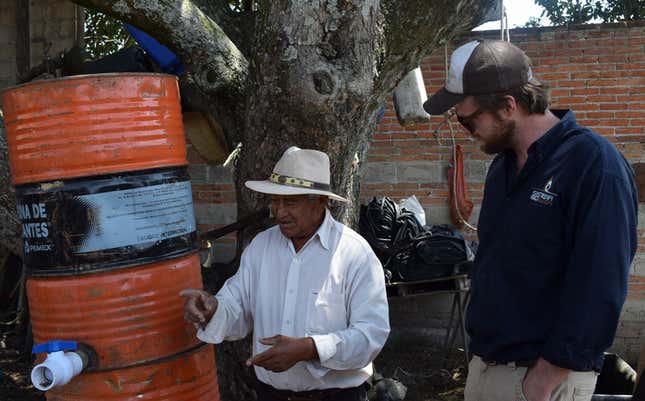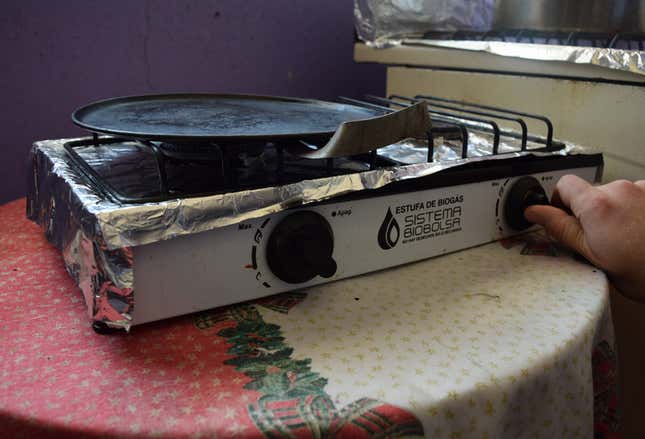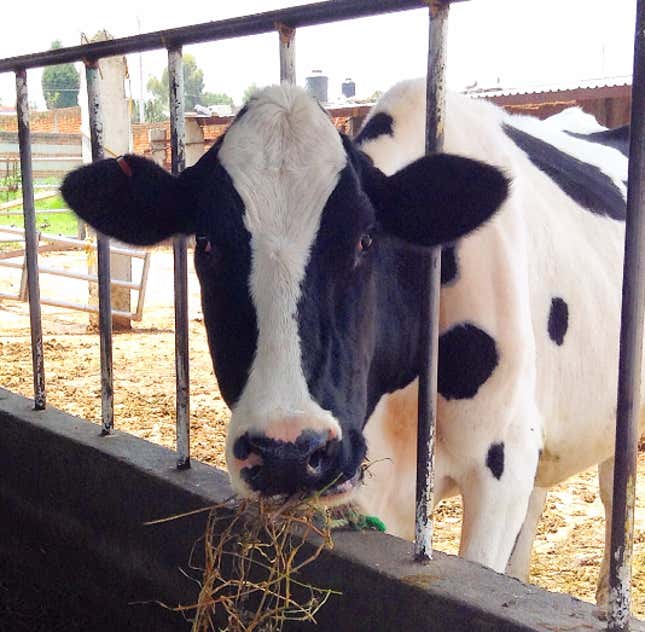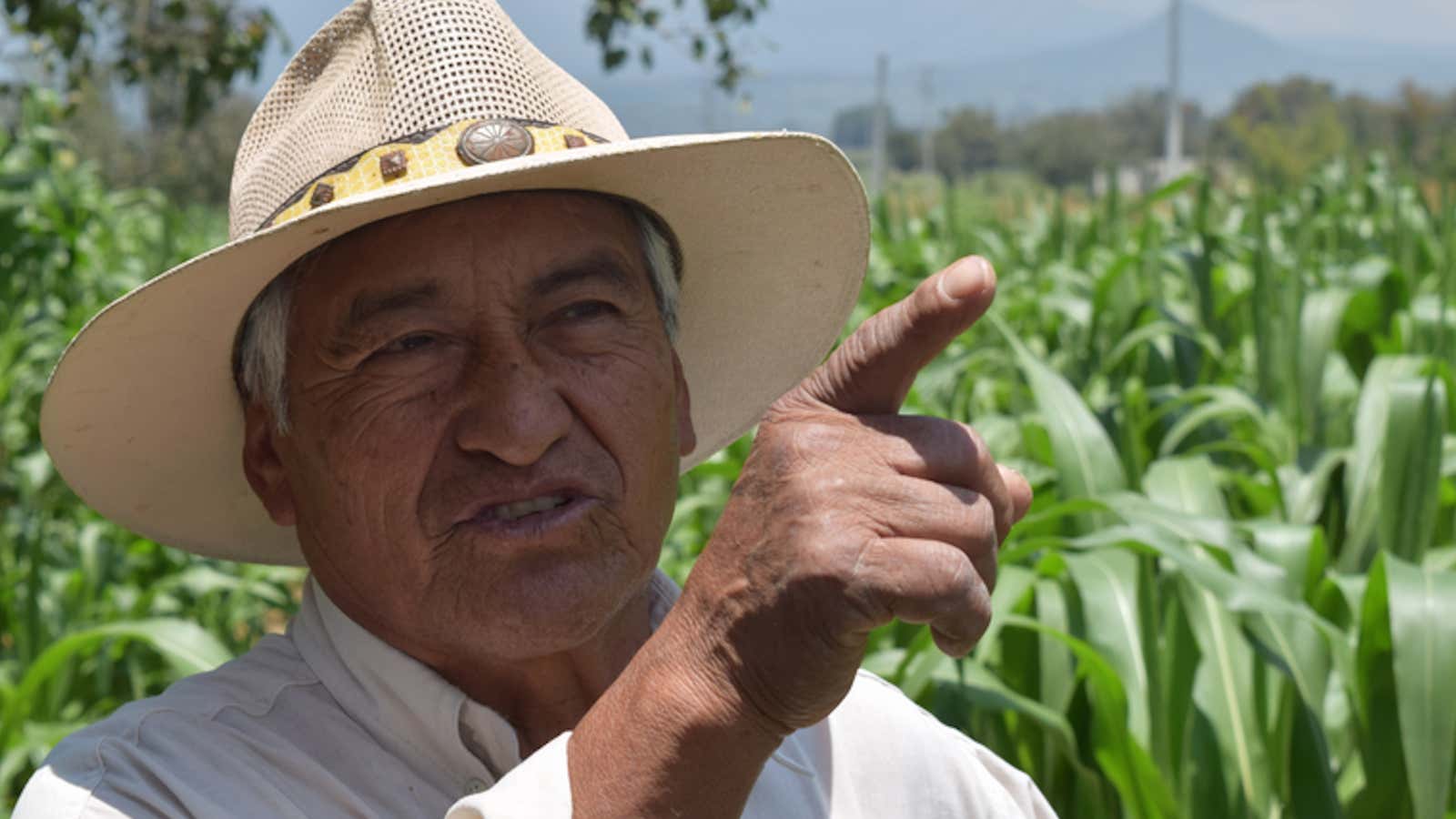The air in San Sebastián Tepalcatepec, a farming community in the south-central Mexican state of Puebla, is hot and dry and, frankly, reeks. Alexander Eaton rolls down the window of his pickup truck and inhales. “This smells like opportunity,” he tells Quartz with a grin.
A few corn fields and cement grocery stores down the road, we pull into the driveway of a small dairy farm. A handful of young children chase each other through the turquoise-painted courtyard, laughing and shrieking. Miguel Rodriguez, the farm’s owner, greets us at the gate and shows us around his property—stalls of cattle chewing on hay, hens milling around a chicken coop, a pot of tomatoes on the kitchen stove, an indoor/outdoor shower, some modest personal living spaces.
A hulking black, bag-like contraption sits in the backyard. It’s a biodigester that Eaton’s company, Sistema Biobolsa, recently installed on the property. Each day, Rodriguez and his farmworkers fill it with cow manure and other waste produced by the animals on his farm. The biodigester then acts as an extension of the animals’ stomachs, breaking the feces down into two substances: biogas, which Rodriguez uses to heat his stove and his water supply, and a nutrient-rich liquid fertilizer he uses to feed his crops.

“It’s a cycle,” Rodriguez explains in Spanish. “We feed the cows, the cows produce waste, then the waste goes back into the farm.” He adds that before the biodigester was installed, he would stack manure into smelly mountains in his side yard then pay to have it hauled away. This new tool not only eliminates that expense (and odor), but his annual energy bill has also been cut in half, and he’s saving on fertilizer costs.
Like rainwater harvesters and solar panels, biodigesters generate power by reinvesting natural resources back into their own ecosystems. Because of their potential to reduce both waste and operating costs, it seems like every family farm should have one on hand. According to the Food and Agriculture Organization of the United Nations, in 2014, there were more than 500 million small farms on the planet, but only 10 million biodigesters.
Eaton, 37, hopes to change that. “I want to create a base of users that leads to a tipping point … a collective aha moment in farming,” he tells Quartz, noting that a large percentage of the world’s more than 2 billion farmers are among the poorest individuals in the world, and more than 95% of Sistema Biobolsa’s clients live in poverty. “Every small farm should have a digester and be able to efficiently recycle its waste.”

To reach these populations and move closer to that tipping point, Sistema Biobolsa employees travel to the most rural areas in Mexico, raising awareness through public demonstration events and neighbors’ testimonials. Since its founding six years ago, the company has installed more than 2,600 biodigesters throughout Mexico and other parts of Latin America. (Along the way, in 2011, the team won first place on the Mexican reality-television show Iniciativa México—a Shark Tank-meets-The Amazing Race-type program for social-impact startups, which brought Sistema Biobolsa a million dollars in funding.)
And they’re not stopping any time soon. With the help of private investors and high-profile partners like the Clinton Global Initiative and the Nature Conservancy, Sistema Biobolsa plans to expand their reach into the most underserved parts of Latin America, the Caribbean, and Africa. Their mantra is simple: There is no waste, only resources. It’s an elegant solution to a problem not enough people know exists.
“We want to empower small farmers to both improve their businesses and emerge as leaders in their communities,” Eaton says. “For us, success is when we make farming more viable and more dignified. Rather than your farmyard being filled with manure and flies, if you have this high-tech piece of equipment, and you’re no longer cooking over this smoky wood stove, you can create a quality of life that’s significantly better.”

Sistema Biobolsa’s biodigesters cost anywhere from $400 to $4,000, depending on the size of the farm, and power everything from two-burner stoves to modern electrical generators. The cost is subsidized with loans from microlending platform Kiva and other sources, and clients have up to two years to fully pay off the equipment, which lasts for at least 30 years. (Editor’s note: The author is a former Kiva Fellow.)
Eaton, who grew up on a farm in New Hampshire, first began working with biogas more than a decade ago when he moved to Mexico for a renewable energy project. His experience in the space led him to notice that many of the biodigesters being installed on smaller farms were flimsily constructed out of cheap material, and the higher-quality ones were too hard for everyday farmers to assemble. So he decided to design a biodigester kit that was both durable and easy to install.
“The solution to poverty is not to give people the cheapest product out there,” Eaton says. “I felt like there was this missing holistic view of how biogas could help people.”
Back on Rodriguez´s farm, Rodriguez shows us just how much biogas has helped his family. The yard is clean and smells pleasantly like the outdoors. Their operating expenses have diminished. They’re enjoying hot showers for the first time.
Rodriguez gestures to the pot of tomatoes on their new stove, hooked up to a gas line that connects directly to the biodigester out back. Their old oven sits in the corner of the kitchen, rusted and unused. “We’re having spaghetti for dinner,” he says. “Our oven is a relic of the past.”
